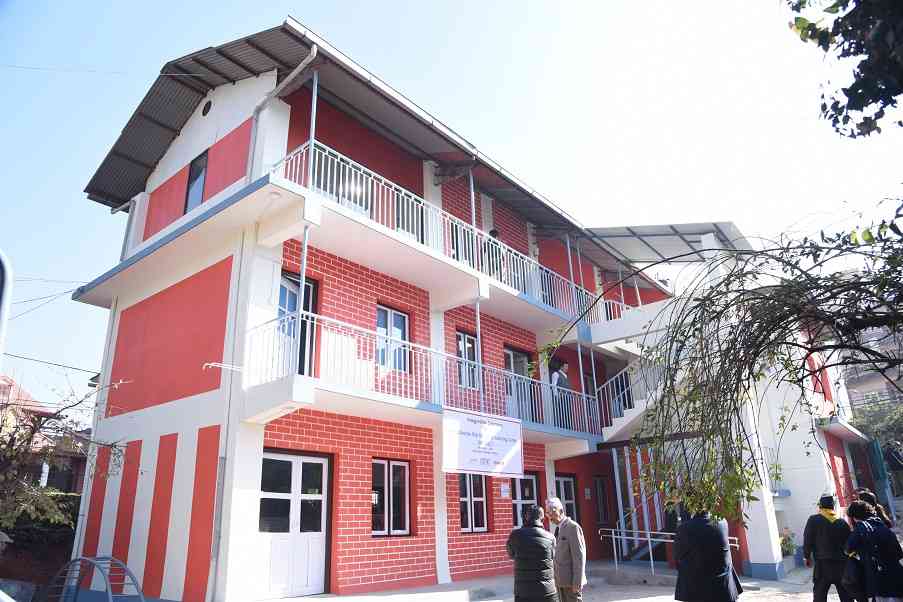Mitra Disaster Risk Reduction Learning Center
Nepal's first disaster risk reduction learning center aims to improve the knowledge sharing of disaster prevention activities in Nepal through schools and communities using creative and innovative tools introduced from Japan and localized in Nepal.
Description
Mitra Disaster Risk Reduction Learning Center (MDRRLC) is the first initiative in Nepal to establish a proper DRR knowledge sharing base in collaboration with the local government, international organization, NGOs and a private support. The center is designed and developed specifically for the purpose, starting from retrofitting a school building, designing the rooms and developing learning material by the local teachers of Nepal. The learning materials were designed based on concepts from Japan's DRR education and localized to Nepal's context to integrate information of various hazards found in Nepal. The center is open to the public with specific visits scheduled by school students and coordinated through the local governments. MDRRLC also aims to train teachers and DRR enthusiasts on continue developing knowledge products and sharing them with the public.
Did the Sendai Framework change or contribute to changes in your activities/organization? If so, how?
Yes. As Target 'E' of the SFDRR calls for the local governments to adopt local DRR strategies, the establishment of the center was critical as it will enhance the deliverable of the local government to further strengthen the understanding of DRR for better execution of their strategies, hence raise resilience among the general public.
What led you to make this commitment/initiative?
What was your position before making this Voluntary Commitment / prior to the Sendai Framework?
DRR framework is useless unless it is turned into practical and result oriented actions on the ground. The understanding of DRR is still at its infancy at the public level in Nepal and needs a drastic enhancement in outreach products. In order to help support the local governments strengthen resiliency at the public level, this center will allow creativity and local innovations to be applied for practical DRR applications at the individual level which can be useful for both professionals and children.
Deliverables and Progress report
Deliverables
Deliverables are the end-products of the initiative/commitment, which can include issuance of publications or knowledge products, outcomes of workshops, training programs, videos, links, photographs, etc.
This project builds on the 2017-2019 project that CityNet Yokohama Project Office and NPO Plus Arts implemented in Nepal to train teachers of five municipalities in Kathmandu Valley on disaster education where educational tool development and implementation strategies were thoroughly introduced and adopted in 18 schools. Disaster education strategies in this case was introduced from Japan which were then localized to fit Nepal's context.
In the current project, this methodology is being expanded to rural municipalities in Nepal, in particular Bhimdatta, Biratnagar, Dharan and Hetauda. Due to the ongoing pandemic at the time, all trainings were conducted online. Educational tool kits have also been distributed to the schools.
The learning center provides the training base for teachers. The training includes DRR education tool development, dissemination and teaching strategies, continuous enhancement of tools and research. The learning center also caters to agencies working on DRR to jointly developing new tools and providing capacity building for public officials. Training of teachers commenced upon inauguration of the center. As of August 2020, teachers from rural municipalities of Nepal are being trained online with pioneering teachers acting as peer teachers.
Porgress report
18 teachers from four rural municipalities of Nepal (Bhimdatta, Biratnagar, Dharan and Hetauda) were trained on using DRR education kit to be used in schools. Originally planned as an onsite training for the teachers, under the COVID-19 circumstances the trainings were held online each month. A total of 6 online trainings as well as individual consultations were conducted to introduce the teachers to the DRR educational material which was produced locally through the previous phase where Plus Arts (Japan based NPO) provided the contents. The material is localized into Nepalese context and can be used for awareness raising programs in schools as well as in the communities.
A total of 10 games were introduced using the material which covered the general hazards which exist in Nepal such as the earthquakes, floods, fires as well as first aid techniques. The training will continue for other teachers as well.
The training achievement in numbers are as follows:
6 online trainings
18 teachers from 10 schools
4 municipalities
3 peer teachers from previous batch
10 DRR games
Organizations and focal points
Implementing Organization(s)
Focal points
